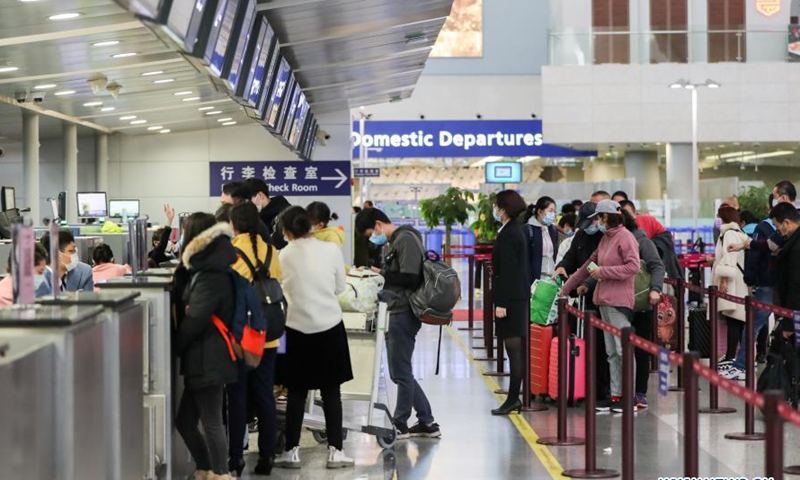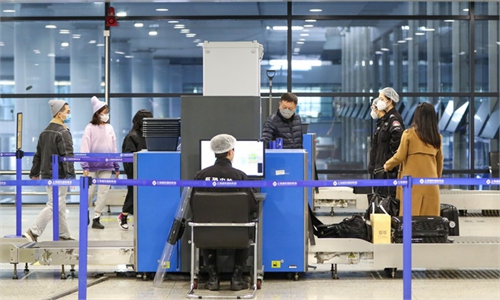Chinese embassies in at least 20 countries announce eased visa policy for receivers of Chinese vaccines

Passengers check in at the domestic departure section of Terminal 2 building of the Shanghai Pudong International Airport in east China's Shanghai, Nov. 24, 2020. The airport's recent daily throughput maintains at around 1,000 flights, with passengers wearing face masks and orderly moving in and out. (Xinhua/Ding Ting)
Chinese embassies in at least 20 countries have, as of Tuesday, begun offering facilitation to visa applicants who have been inoculated with China-produced COVID-19 vaccines as part of efforts to resume international exchanges under strict epidemic prevention measures.In addition to the Chinese embassies in Australia, South Korea and Nigeria issuing the notice on Tuesday, the countries now include Greece, India, Italy, Pakistan, Israel, Norway and Indonesia, among others.
Those coming to China for work, their family members and foreign family members of Chinese citizens or permanent residents who come to China for reunions and visiting are included.
A notice from the Chinese embassy in Greece said visa applicants are required to have both injections of one of China's inactivated vaccines, or other types of Chinese vaccine with a single-dose injection at least 14 days before application.
Certificates of negative results from COVID-19 nucleic acid tests along with IgG antibody tests are still needed to board a flight, according to the Chinese Foreign Ministry.
Ministry spokesperson Zhao Lijian said on Tuesday the move is an exploratory action that aims to facilitate travel based on full consideration of the vaccines' safety and efficacy, and it has no connection with vaccination mutual recognition. For vaccine recognition, Zhao said the previous day that China is willing to communicate with other countries on mutual recognition and that foreign vaccine producers can apply to relevant Chinese authorities for approval.
Some foreign nationals told the Global Times the policy is a positive signal to promote the resumption of people-to-people exchanges. They also expressed hope that the mechanism could recognize foreign vaccines in the future, and more countries can establish a similar mechanism to expand the scope of people who can benefit.
A Sydney-based Australian national told the Global Times on Tuesday that as the Australian government has not approved Chinese vaccines, he cannot benefit from the policy yet. The man who gave his surname as Butcher has received the vaccine by Oxford-AstraZeneca.
"China is actively pushing the mutual recognition of vaccines to resume personnel exchanges, and I believe foreign vaccines will finally be recognized," Butcher said, but he is not sure whether Western countries can cast aside bias and do the same.
Chinese experts have advised the World Health Organization to take the lead in coordinating a vaccine mutual recognition platform globally, which can serve as a basis for travel document application and potential quarantine exemptions.
But practical and ethical concerns remain challenging and whether quarantine policies should be adjusted accordingly is still under discussion, experts said.

